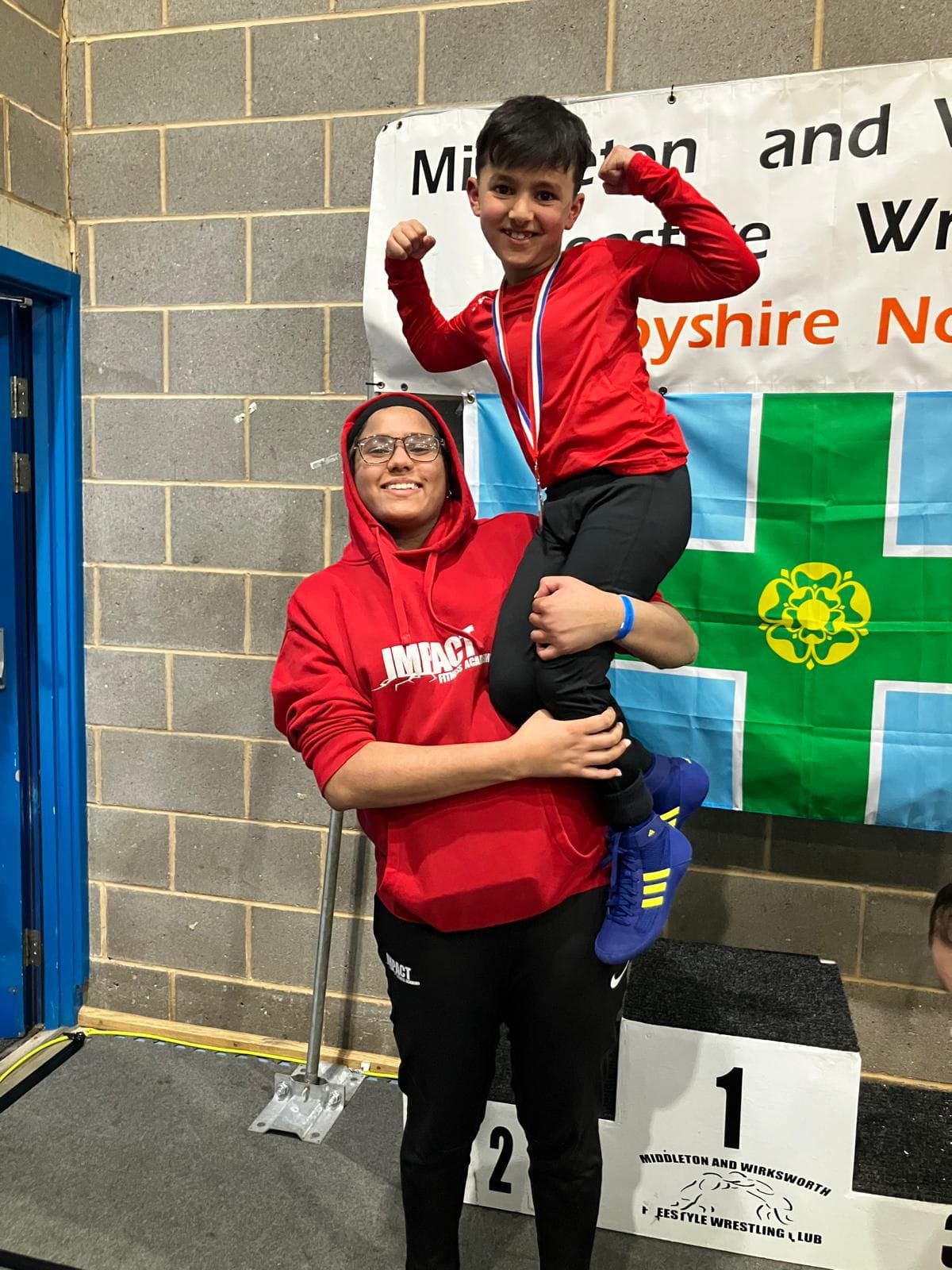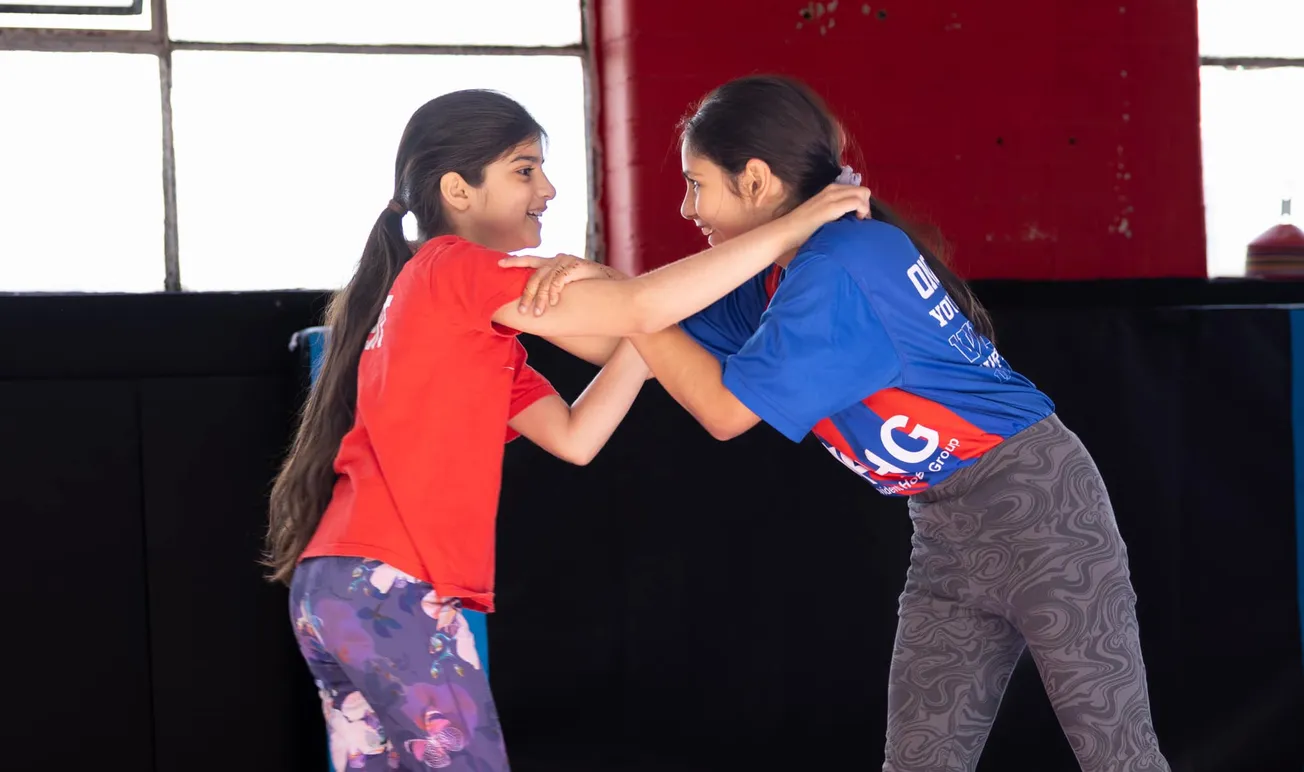It’s 18:30 on a Thursday evening and Tyseley is drowsy as I walk towards Impact Fitness Academy on James Road. A few commuters pass by the old warehouses lining the street, now home to local businesses like solicitors, auto-parts shops and, peculiarly, a gauge and thermometer specialist. But as I head upstairs into the gym behind a father and son duo in Academy t-shirts, this sleepy district springs to life.
On bright blue and red mats, little limbs are flying. At first glance, the cartwheels, head-stands, and tussles look like a Looney Tunes style brawl, save for a billowing cloud of dust. In fact, it’s a class in one of the oldest martial arts in the world: wrestling. Freestyle wrestling to be specific, and the 20 or so junior students are in the midst of learning a ‘double leg’, a category of offensive move where, as the name suggests, you attack both of your opponent’s legs to take them down.

Haniyah Kousar, who is currently Impact’s only female coach, is helping a student with their homework on the sidelines. The 22-year-old has been coaching wrestling for nearly four years, having found a love for the sport at just three years old. “I actually grew up with three older brothers. My oldest brother loved martial arts and I started doing wrestling, boxing, that sort of stuff, just at home,” she tells me. When she qualified as a coach, she became the first Muslim female in the country to do so and now runs Impact’s weekly women’s only class as well as various youth activities on the weekends, including both wrestling and homework club.
The ultimate goal in freestyle wrestling is to pin your opponent’s shoulders to the mat, a ‘victory by fall’, and the 5-10-year-old experienced group at Impact were proving to be quite deft at it. They each practise with their size-matched partners, swapping offensive and defensive roles to perfect their technique. Most bouts of competitive wrestling nowadays will be decided on points rather than a fall, which founder and head-coach Farid Mohammed reminds the room: “I want to see proper technique. Why?”. Some more little limbs shoot into the air. “Coach, coach!” a keen hand pleaded. “Because you score more points,” he puts them out of their misery.
“I think I’m seen as the nice coach,” Kousar smiles. She does indeed come across very affably despite her formidable nearly two-decades in combat sports. That’s not to say that coach Mohammed isn’t nice — “they do get play days,” he assures me —- but in a sport where discipline is essential to success, someone must play the disciplinarian.
Coaches Kousar, Mohammed, and the three other team members at Impact are instilling confidence, and most palpably, a sense of community in their junior and adult students (which earned them a Community Initiative award at this year’s British Muslim Awards). Along with Kousar’s female only classes and homework club, she has also started a chess club, which is not only a great way for the kids to improve their strategic thinking, a vital skill for success on the mat, but also cements the club as much more than a fitness space.
Kousar, a Birmingham native, played chess competitively growing up, and, although she started wrestling at a very young age, it was these other sports that took precedence until college when she volunteered at Impact’s annual competition, SLAM Birmingham. “I loved the whole environment and they offered me the opportunity to train and potentially become a coach,” she says. In 2023 she received her Level Two coaching qualification and took over a number of classes at Impact Fitness whilst also pursuing her degree in Sport and Exercise Science, working at a housing project, and tutoring on the side.
Enjoying this edition? You can get two totally free editions of The Dispatch every week by signing up to our regular mailing list. Just click the button below. No cost. Just old school local journalism.
The presence of a female coach at Impact has done wonders for their female students, especially those who are Muslim and Hijabi like Haniyah. “For religious reasons a lot of girls will stop wrestling around the age of 12,” she says. “Wrestling is such a hands on sport, the coaching is also hands on, so what we've tried to do is create a female only space where they can feel more comfortable. My girls, they're able to take off their hijabs when they train, which is something they wouldn't be able to do if it was a male coach or if there were males in the class.”
The gym will also lower all of the blinds and leave plenty of time before and after their female sessions so the women and girls can comfortably exercise in private. One of Kousar’s 16-year-old students is even working towards her own coaching qualifications.
Club manager Sahara Mohammed, who is also the Women and Girls Development Officer and Midland’s Chair for British Wrestling, makes it clear that “it’s about girls finding their own space in wrestling,” and creating that space, rather than requiring them to fit into the ”macho” image of the previously male dominated sport.

She has been responsible for setting up 12 women’s programmes across the country, the first female only competition, and hosts events at Impact discussing gender disaggregated coaching and adaptations for female athletes – a topic not currently covered on coaching curriculums. “Of course the female anatomy is very different,” says Kousar, who often didn’t have a female partner to train with when she started, “we may go through cycles that affect training programmes, which is why having a female coach [who understands that] is very good.”
The first Women’s World Championship took place less than 40 years ago in 1987 and, in the States, it’s only in the last ten years that female wrestling has seen a boom, with five times more high-school aged girls (14-18) taking part in 2023 compared with 2013.
But the sport needs to adapt for this growing demographic and there are still issues at its elite levels that prevent certain athletes reaching their full potential. Kousar made headlines in 2024 by speaking out against United World Wrestling’s (UWW; the international governing body for amateur wrestling) exclusionary uniform rules. They require that competitors wear only a singlet; a one-piece that looks like a swimming costume with shorts. For female Muslim wrestlers who choose to dress modestly, as well as any wrestler who is uncomfortable competing in the outfit, this results in a de facto barring from all UWW events, including the Olympic and Commonwealth games.
“I think if the rules were different I would definitely be interested in training to a competitive level and on international stages,” Kousar tells me. Although many non-UWW events, including those supervised by British Wrestling, allow competitors to wear full-body garments underneath the singlet, the ultimate exclusion from some of the sport’s most glorified competitions means training to an elite level will always be tinged with some degree of disappointment. “It's the same thing for the girls that I train,” she says. “It's so difficult to convince them to choose to take that path knowing that there could be disappointment at the end of it.”
Kousar says that, because in the UK there are currently no wrestlers trying to compete at that level who can’t because of the regulations, they don’t have much bargaining power. This isn’t true in the US, however, where wrestling is a much more ubiquitous past-time. Jamilah and Latifa McBryde, two hijabi sisters from Buffalo, New York, have both been prevented from competing for the United States team at international UWW competitions. When they challenged UWW in 2023 the response was a definitive, 177-word letter stating the rules would not be changing to accommodate them.
The Secretary General, Carlos Roy, cited a test session held in June of the same year, during which one wrestler wore a singlet and the other a “Classical style uniform”, a full-coverage ensemble that Kousar describes as “basically joggers and a tight top.” Three UWW representatives in attendance found that “both wrestlers faced unequal opportunities to fully execute their techniques and tactics, whether in offensive or defensive manoeuvres.” They haven’t elaborated on what advantages or disadvantages each wrestler faced, nor publicly considered a resolution that is both inclusive and sportingly fair. They also didn’t respond to my request for comment.
Although some of Impact’s students have had great success competing domestically and internationally, competition is just a small aspect of such a holistic, ancient, and cultural practice. “It’s such good character building,” Haniyah enthusiastically tells me as the kids practise a ‘crocodile roll’, “it helps you control your emotions and especially from a female perspective, being able to defend yourself, I think it’s so important. It’s amazing that I get to help [people] feel more confident.”
She recalls the joy of seeing a student master their first cartwheel or come running excitedly into class after two months of crying at the door. Kyon Hosseini, whose ten-year-old son and seven-year-old daughter both train at Impact, tells me the growth in confidence he’s seen in his children has been immense after just a year and a half at the club.
As the session ends, I try to dodge the excited little bodies running to high-five their waiting parents and, presumably, wreak havoc on their siblings with new and improved takedowns. Stepping back onto the quiet street my curiosity for the city is renewed, as I wonder how many other inconspicuous warehouses are home to such dynamic, energetic, and community-defining projects.
Are there any Birmingham initiatives or projects you want The Dispatch to know about? Email editor@birminghamdispatch.co.uk.









Comments